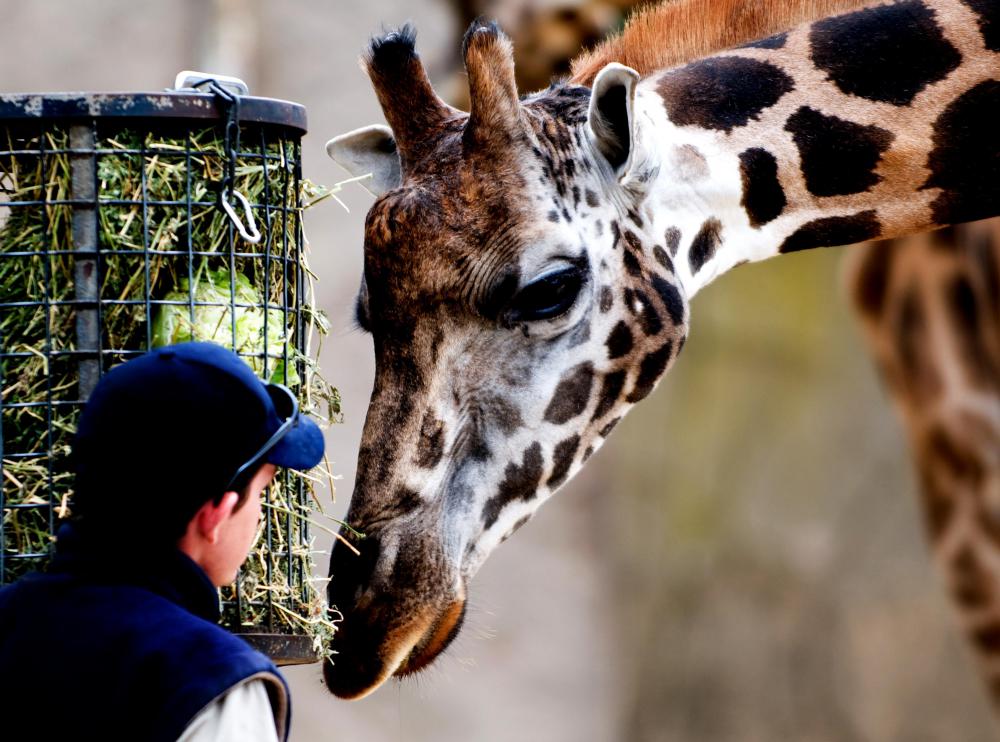At AllThingsNature, we're committed to delivering accurate, trustworthy information. Our expert-authored content is rigorously fact-checked and sourced from credible authorities. Discover how we uphold the highest standards in providing you with reliable knowledge.
What does a Veterinary Ophthalmologist do?
Like humans with special eye care needs, animals sometimes need to see an eye specialist. In this case, the animal eye doctor is known as a veterinary ophthalmologist. This line of veterinary medicine involves both diagnosing and treating animal eye conditions, particularly in zoo animals and pets.
Some veterinary ophthalmologists specialize in caring for one specific animal species. An animal eye doctor who only treats cats, for example, is known as a feline ophthalmologist, while a veterinary ophthalmologist who specializes in dogs is a canine ophthalmologist. Most animal doctors who work in the eye care field, however, are general veterinary ophthalmologists who care for multiple species.

A veterinary ophthalmologist often engages in veterinary surgery. This may be necessary for animals who are suffering from conditions such as eyelid masses or glaucoma. In most cases, however, an animal ophthalmologist can treat problems without having to cut the animal by providing medication and therapy. Rather than using a knife, many animal treatments can be carried out through freezing procedures or laser operations.

In order to claim the status of a veterinary ophthalmologist, one must usually be board certified by a reputable organization. He or she typically needs a degree in veterinary medicine from a recognized university, which averages out to eight years of study. A veterinary eye doctor must usually complete a minimum of one year of advanced training prior to becoming an eye care specialist. Completing a residency program with an animal eye institution is often required as well. A competency exam, continuing education credits, and other requirements may also be necessary depending upon the location of the work.

Animals can develop over 40 different eye conditions, and veterinary eye doctors must be knowledgeable about all of these in order to correctly diagnose and treat a patient. Veterinary ophthalmologists are typically trained to use the latest modern technology in caring for the eyes of animals. Some specialized devices that a veterinary ophthalmologist may expect to use might include tonometers, slit lamp biomicroscopes, and indirect ophthalmoscopes. Since these doctors deal with patients who cannot speak for themselves or often understand what is happening, they must also be well versed in animal sedation, as well as have a knowledge of how to gauge pain and other symptoms based on animal behavior.
Companion animals, service animals, and other creatures are typically referred to a veterinary ophthalmologist by their regular veterinarian after a problematic eye condition has been identified or suspected. Some animals that typically see a veterinary eye doctor include pets, such as dogs and cats, as well as farm animals, such as horses. Animals from zoos and circuses are often referred to an animal eye specialist as well.
Frequently Asked Questions
What is a veterinary ophthalmologist?
A veterinary ophthalmologist is a veterinarian who specializes in the diagnosis and treatment of eye conditions in animals. They undergo advanced training beyond veterinary school to address complex eye diseases, perform surgeries, and provide comprehensive eye care for a variety of animal species.
What kind of conditions does a veterinary ophthalmologist treat?
Veterinary ophthalmologists treat a range of eye conditions including cataracts, glaucoma, retinal diseases, corneal ulcers, and eye injuries. They also manage congenital eye issues and can perform surgeries such as cataract extraction, corneal repair, and even intricate procedures to correct vision impairments.
How does an animal get referred to a veterinary ophthalmologist?
An animal is typically referred to a veterinary ophthalmologist by a general practice veterinarian. This referral usually occurs after an initial assessment suggests a more complex eye issue that requires specialized care. Pet owners may also seek out an ophthalmologist if they notice signs of eye distress in their animals.
Are there any specific qualifications a veterinary ophthalmologist must have?
Yes, a veterinary ophthalmologist must complete a Doctor of Veterinary Medicine (DVM) degree, followed by a multi-year residency program in ophthalmology. They must also pass a rigorous board certification exam administered by the American College of Veterinary Ophthalmologists (ACVO) to be recognized as specialists in this field.
Can all animals be treated by a veterinary ophthalmologist?
Most veterinary ophthalmologists are trained to treat a wide range of animals, from domestic pets like dogs and cats to exotic species and large animals such as horses and livestock. Their expertise is adaptable to the unique anatomical and physiological eye characteristics of different animal species.
What is the success rate of veterinary ophthalmologic surgeries?
The success rate of veterinary ophthalmologic surgeries varies depending on the condition being treated, the animal's overall health, and the complexity of the procedure. For instance, cataract surgery in dogs has a high success rate, with about 90% of dogs regaining good vision post-operation, according to veterinary medical data.
AS FEATURED ON:
AS FEATURED ON:













Discuss this Article
Post your comments